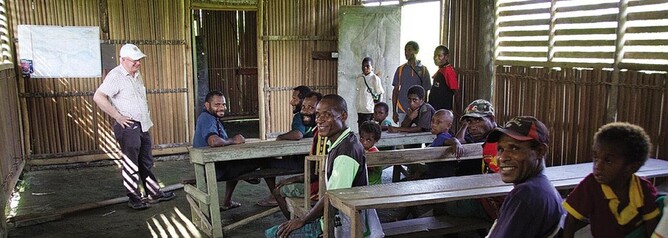Decision making is part of our everyday lives. On many mornings my first decision needs to be made the moment I wake up. I have to decide, “Where am I today?” It could be Madrid, Montreal, Manchester, Munich, Miami, Malavalli, Madrigueras, Malawi, Mongolia or Magleri — or any of the many other places beginning with a different letter of the alphabet where I’ve stayed in the past year. My second decision of the day quickly follows — and it’s equally as important as the first if I am to avoid certain pain! I have to decide whose house I’m in and which side of the bed or couch I need to get out of if I am to avoid a collision with a wall or some other furniture.
In the AMT Daily Prayer Guide some of us are listed as ‘Itinerant’. I am one of those. The dictionary definition of ‘itinerant’ is ‘a person who travels from place to place’. That pretty much sums up the privilege I have of serving the Lord in the way that I do. Whether it’s dropping by the Bible School at Anguganak in PNG or visiting my Romanian friends, both in Romania and the many places throughout the world where the Romanian ‘diaspora’ live, many of my days in a year are spent in a different location with different people. A ‘typical day’ for me is that there is very little that is ‘typical’ in terms of location and the people I am with.
As I woke up one Sunday last June, the immediate heat and humidity of the jungle hit me. The general ‘where am I today?’ decision was fairly easily made on this particular Sunday morning. I was obviously in the jungle somewhere in Papua New Guinea. I remembered that I was in one of those ‘M’ places mentioned above, Magleri, a village surrounded by jungle not too far from the mighty Sepik River. Magleri has to be one of the most isolated places on the face of the earth.
Having decided where I was, the next decision was easy. There was no need to decide which side of the bed was safe to get out of this morning. All I needed to do was roll over, either to the left or right, out from under my mosquito net and onto the bamboo floor just a centimetre or two below the thin piece of thin foam on which I had been sleeping.
I had arrived in Magleri the previous afternoon with Paul, the MAF pilot based in Wewak, Lawrence, one of our Bible school teachers, as well as Taitus and Nelson, our fourth-year students. Even finding the airstrip amidst the all-pervasive green of the jungle had taken some time. As we landed and taxied towards the ‘parking bay’, a patch of grass beside the bush materials elementary school classroom, we saw a group of people excitedly waiting to meet us. It is rare to have a plane land at Magleri these days and even rarer to have one land on a Saturday afternoon. We had come to show the Jesus Film that night, and to share with our brothers and sisters on the Sunday morning.
Our visit to Magleri was the result of a conversation I had when I was back home at Anguganak in January last year. Paul and I were talking at the airstrip at Anguganak while we pumped fuel from a drum into his plane. In our conversation I mentioned that 20 years or more ago Don, the pilot at the time, had on occasions shown the Jesus Film in some remote villages. (The Jesus Film had been dubbed in Tok Pisin, the trade language of Papua New Guinea.) After returning from flying around the Sepik during the day, Don would come back to Anguganak, pick up a couple of our Bible school students, the projection equipment and me, and we would fly off to an isolated airstrip for the night to show the Jesus Film. We would return to Anguganak next morning in time for Don to start his daily flying program and, for us, our classes at the Bible school.
While talking in January, Paul asked if I thought there was still a need for the Jesus Film to be shown. I told him I was expecting a couple of my PNG friends from some isolated areas to drop by for a visit, and I would ask them what they thought. When I did, each of them was most enthusiastic about this possibility in their area. They pointed out that the current generation of young people had never had the gospel presented in this way. They recalled the powerful impact that the film had in their areas when they were young.
The brothers mentioned too how the Jesus Film was helpful to people in other ways. Living in a country where it rains frequently and everything is lush and green, the concept of a desert is hard to imagine. When a person has never seen a sheep or a donkey, fields of wheat, a grapevine or a loaf of bread, it is difficult to explain certain Bible passages and biblical concepts. The film allowed people to see the life of the Lord Jesus in the context of the land and culture in which He lived. This really helped in understanding many of the illustrations and parables that our Lord used in His teaching.
Five months after our conversation on the Anguganak airstrip, we arrived at Magleri. Paul estimated that more than 600 people had appeared out of the jungle for the film show. A large white sheet, attached to the elementary school wall, served as a screen and the ground provided suitable seating! After a brief introduction by one of the local church leaders, a few communal songs and two songs by us from the Bible school, there was an immediate hush as the Jesus Film began. Halfway through the film there was a typical early evening downpour, so we beat a hasty retreat to the elementary school classroom, set up the equipment and continued with the film. How so many people fitted into that small classroom had to be seen to be believed. People ‘hanging from the rafters’ took on a literal meaning.
The dialogue from the Jesus Film is taken directly from the Book of Luke and at the conclusion of the film, after a closing prayer of dedication, people filed out quietly. It was clear that God’s Word portrayed so vividly in the film was speaking to many. For the first time, many had seen as well as heard a presentation of the Good News. One young man said to Paul after the film, “When I was a boy my father told me that Jesus died for me, but now I understand.” Paul had brought along with him some Tok Pisin Bibles as part of a valuable programme that MAF has of selling bibles at a greatly subsidized rate. The subsidy makes it possible for people to have a copy of the Word of God for themselves. His supply of one hundred bibles ran out before we had left the two villages we visited that weekend. He took orders from many more to be delivered the next time he flew in.
As I awoke and rolled out of bed that Sunday morning in Magleri, I could already hear the sound of young people’s voices practising some songs for the morning service. The garamut — a hollowed-out log beaten to call people to meet — sounded and we wandered down the track to the large, bamboo-walled and leaf-covered building where the believers gathered. There was no need for windows, and the sizeable gap between the foundation posts and the walls allowed for a good circulation of air which was most welcome as it was very hot and humid, even early in the morning. Our seats were logs of wood placed in rows on the earthen floor. As is our custom, the sisters sat on one side and the brothers on the other. The singing was wonderful as were the items and testimonies of those who went forward to share. We as visitors introduced ourselves and sang a song, and Lawrence shared a message from God’s Word.
The Lord’s Supper is always a special time for a local church in Papua New Guinea. It is too hot for grain to grow in PNG, so bread is not available in the bush. Instead we use banana or sweet potato to remember the Lord’s body. Wine too is not a possibility in the bush, so we usually use coconut juice to remember the Lord Jesus. Areas like Magleri are basically cashless, and so the church collection is always interesting. Brothers and sisters bring to the front of the church their offerings to the Lord. We were the blessed recipients of the offering that Sunday morning, and travelled back to Anguganak with gifts of dried coconuts, lengths of bamboo filled with sago, bananas, dried fish and wild fowl eggs gathered from the bush.
After the service, Paul did his take-off calculations. He decided that because of the shortness of the airstrip and our weight, it would be better to shuttle us across in two groups to Edwaki, where we had shown the Jesus film on Friday night. Edwaki was a ten-minute flight away — or a 24-hour walk. I went across on the first flight to Edwaki so that I could spend some time with some of our Bible school graduates: Elijah, Abel, Andrew, Jerry, Jimmy and their families. It was with sadness that we said our good byes to the brothers and sisters at Magleri. Our parting came with a promise to pray for one another as well as a request by the brothers that a group of our Bible school students include Magleri on their list of places to visit when we have our next Long Outreach.
While I was waiting for the plane to return to Edwaki to pick us up, I had the opportunity to catch up again with Andrew and his elderly father. Andrew had graduated from our Bible school 15 years earlier and he is a close friend. When he graduated, I had been amazed to see his father show up for the graduation service. His elderly Dad had walked three full days to Anguganak to be there for Andrew’s graduation. His father had been around at the time of the early missionaries to the area, and I know it brought him great joy to see Andrew fulfilling his useful role in the local community as an elementary school teacher and a respected church leader in the area.
Paul planned to drop us off at Anguganak, refuel and continue alone to his home base in Wewak. As we landed at Anguganak, apart from the other students and their families waiting to meet us, I could see some of the Anguganak Health Centre staff waiting for the plane to arrive. Lying on a stretcher, with an IV coming from her arm, was a lady who had been in labour for three days, and things were not going well for her.
Under God’s good hand, we had arrived back at Anguganak in time for Paul to be able to medevac the patient, accompanied by her anxious husband, to the Wewak General Hospital. A wonderful day at Magleri sharing about our Lord Jesus, the One Who gives eternal life, was capped off by seeing our Lord Jesus giving this lady and her child an opportunity for physical life.
Graeme Erb


